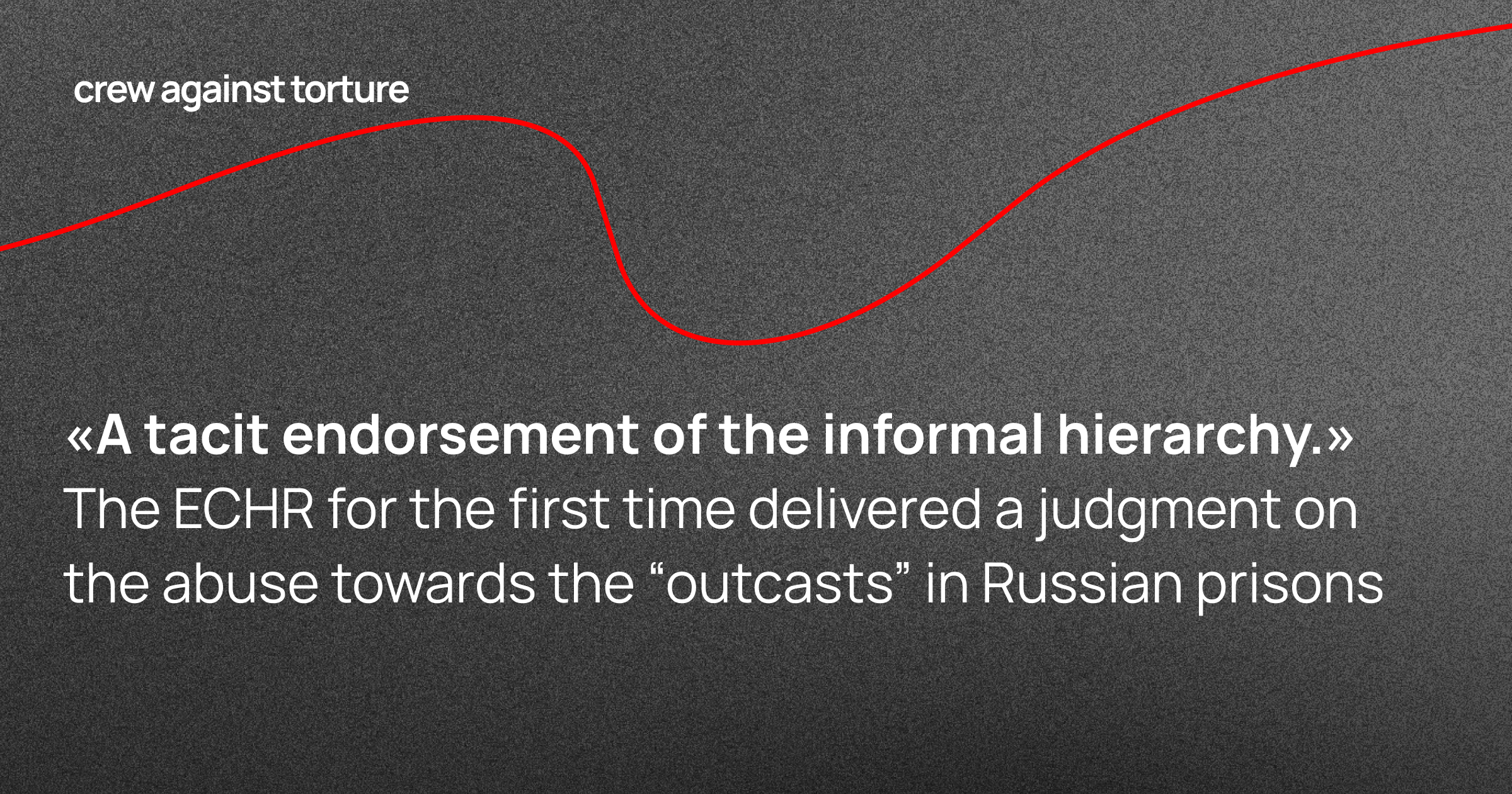НАСТОЯЩИЙ МАТЕРИАЛ (ИНФОРМАЦИЯ) ПРОИЗВЕДЕН, РАСПРОСТРАНЕН И (ИЛИ) НАПРАВЛЕН ИНОСТРАННЫМ АГЕНТОМ «КОМАНДА ПРОТИВ ПЫТОК» ЛИБО КАСАЕТСЯ ДЕЯТЕЛЬНОСТИ ИНОСТРАННОГО АГЕНТА «КОМАНДА ПРОТИВ ПЫТОК» | 18+
The «outcasts» or «downgraded» are the most vulnerable category in Russian prisons. They cannot be touched, they are allocated separate living quarters and cutlery. These people do dirty work, are humiliated, beaten and forced to have sex. The Russian authorities are aware of such a hierarchy, but do nothing to solve the problem. Moreover, according to the prisoners themselves, it is beneficial for the management of the colonies to maintain caste separation. The ECHR’s judgment concerns 11 applicants who were “downgraded” in the colonies of the Kostroma, Sverdlovsk, Irkutsk regions, as well as in the Republics of Komi, Mari El and Mordovia.
The judgment of the European Court describes in detail the hierarchy in Russian prisons. At the top are the «criminal elite» — hardened criminals with numerous convictions. They consolidate power with threats and violence. Next come the «collaborators» or «reds» who work with prison officers. The vast majority of prisoners fall into the broad category of «lads». At the very bottom of that informal hierarchy are the «downgraded». They do work that is considered unsuitable for other prisoners: cleaning toilets, showers, bathhouses or sports fields. According to the applicants, the management of the colonies is interested in such a distribution according to castes and takes care that there are «downgraded» prisoners in each brigade.
One can become «downgraded» for various reasons. The applicants V.D., A.S., and S.I. were assigned to the «outcasts» category after they had been convicted of sexual offenses. In the case of V.D., the prison authorities disclosed information about the offenses of which he had been convicted by placing his photograph on a notice board in a common area with the caption «inclined to paedophilia». One can also get that humiliating status by accidentally touching the belongings of another «outcast» prisoner or, for example, admitting that he had oral or anal sex in a passive role, even if it was by mutual consent.
When transferred to another colony, a prisoner cannot remove this status. He has to disclose it to their fellow inmates, or it is done by the management through an informal overseer who would also assign the «outcasts» to either do menial chores or provide sexual services to other inmates. Had they refused to provide the services they have been assigned to, they would have been subjected to severe beatings and sexual or sexualised violence.
The applicant V.I., who was forced to provide sexual services to other prisoners, contracted HIV. Upon admission to the institution in March 2012, he had a negative test, and in January 2016 it was already positive. The applicants also claimed that they could not eat or bathe with others, they could sleep on the floor for months and not receive the necessary medical care for a long time.
According to the applicants, the prison authorities are not only aware of the existing informal hierarchy, but are also involved in it. Therefore, any complaints to the prison administration are ineffective and even dangerous. Nevertheless, the prisoners complained to various state bodies, but either there was no reaction, or the violations were denied.
The ECHR draws attention to the answer that the applicant A.M. received in 2016 from a certain Commissioner for Human Rights (there is no specification of the exact person). This is the only official document in which a state authority does not deny the existence of a hierarchy in prisons — but considers the relevant complaints ineffective:
«It is hardly conceivable that a facility governor or supervising prosecutor would publicly admit that nearly all penal facilities secretly subdivide prisoners into the «elite», «blokes», «collaborators», «degraded social status», as well as «activists», «reds», «blacks», etc. For that reason, any direct inquiry or complaint about the existing unregulated conditions of detention of prisoners having degraded social status will elicit a predictable response from those authorities.»
Russia’s response to the European Court’s questions about caste division in prisons can also be called predictable. The ECHR underlined that «the Government neither confirmed nor denied the applicants’ allegations concerning the existence of an informal prisoner hierarchy and their place within it; in fact, they avoided any mention of the term ‘outcast prisoners’ or any similar term in their observations.»
The Court accepts that even if the prisoners’ complaints were properly investigated, this would not improve their situation. «A transfer to another facility would have done nothing to remove the stigma attached to the ‘outcast’ status which the applicants were bound to carry with them for as long as they remained in facilities governed by an informal code of conduct.»
Subsequently, the Court concluded that the Russian authorities had violated the prisoners’ rights under Articles 3 and 13 of the Convention: the applicants were subjected to inhuman and degrading treatment, and there is no mechanism in Russia that allows any prisoner in such a situation to effectively defend himself. The Court indicated that Russia must pay the applicants the amounts they demand as compensation for non-pecuniary damage of which the highest amount is 20 000 euros.
The CAT’s lawyer:
«Although there have been occasional references to the caste system in Russian prisons at the international level (for instance, the report on the CPT’s visit to Russia in 2012) and at the national level (members of the regional public monitoring commissions, the Commissioner for Human Rights), the problem has never been officially named, not acknowledged, much less not analyzed at the state level. The ECHR’s judgment mentions the problem of prison castes for the first time — and this is the first key step. That problem, therefore, is likely to be brought to the attention of the international community. Although Russia will not execute the judgment, it may play a role in the future».
